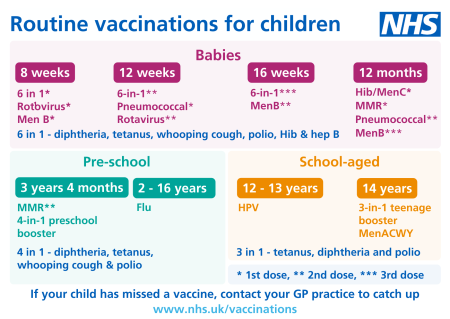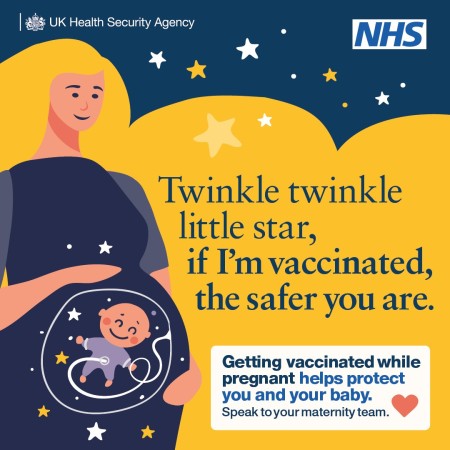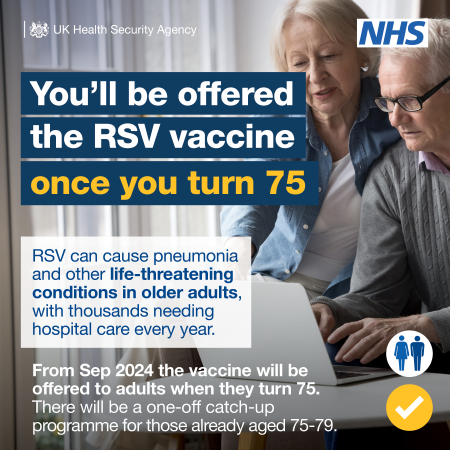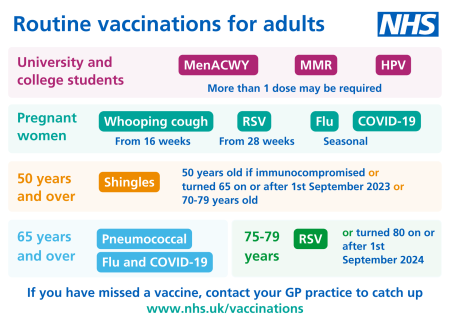Winter vaccine campaign will soon be starting. If you are eligible you should receive an invitation from the practice to book in.
Covid Autumn Booster will be offered to patients:
- adults aged 75 years and over
- residents in care homes for older adults
- individuals who are immunosuppressed aged 6 months and over. Full details of this eligibility can be found here.
Flu Vaccinations will be offered to patients:
- aged 18 to under 65 years in clinical risk groups
- pregnant women
- all those aged 65 years and over
- those in long-stay residential care homes
- carers in receipt of carer’s allowance or main carer of an older or disabled person
- household contacts of immunocompromised individuals
- frontline health and social care staff
- full details of eligibility can be found here
Nasal Flu Vaccinations will be offered to patients:
- aged 6 months to 17 years in clinical risk groups
- aged 2 and 3 years on 31 August 2025
- eligible school-aged children (Reception to Year 11)
NHS childhood vaccination schedule to shift to a new 18 month appointment
The NHS childhood vaccination schedule will change from 1st July 2025 for a number of vaccinations, something the NHS in Lincolnshire is keen to ensure parents and guardians of 0 – 5 year-olds are aware of.
This change follows on from Joint Committee on Vaccination and Immunisation (JCVI) recommendations for a number of vaccination schedule changes.
“The change to the NHS childhood vaccination schedule will affect several childhood vaccines including MMR, PCV, MenB, and Hib/Men C. It will also see the introduction of a new 18 month appointment starting from 1st January 2026,” explains Karen Goy, Lead Nurse for Quality and Risk – Vaccination Programme, NHS Lincolnshire Integrated Care Board.
“In practical terms what this means is that, from 1 July 2025, some babies and children will be offered a new schedule for some vaccinations. For those born from 1st July 2024 onwards, the current 12 month Hib/MenC vaccine will stop and will be replaced with a further Hib-containing vaccine given at 18 months alongside the bringing forward of the second dose of MMR vaccine. Those born before 1st July 2024 will remain on the current schedule, having already have received vaccines to protect against these diseases.
“Additionally, the MenB vaccine will be given at 12 weeks rather than the current 16 to offer earlier protection following recent studies showing MenB circulating in younger children. This will replace PCV which will be given at 16 weeks to reduce the number of vaccines given in one appointment. All of these changes are driven by a need to offer protection to children against serious diseases at the right time, providing protection when children need it most.”
Due to the success of the National teenage MenACWY vaccination programme, MenC is now very well controlled in the UK with very low cases annually. As a result, a dose of MenC containing vaccine is no longer required in the second year of life and children will now receive their first dose of MenC in school year 9 as part of the MenACWY programme.
Vaccinations save lives and protect people’s health, ranking second only to clean water as the most effective public health intervention to protect disease. So, from 1 July 2025, the NHS wants parents and guardians of 0-5 year-old children to remember to make sure their children are up to date with their childhood vaccinations, such as MMR and MenB.
“Childhood vaccines alone prevent between 3.5 and 5 million deaths every year across the world, however, vaccination uptake in England has been declining for over ten years,” comments Karen. “Really, what this change to the childhood vaccination schedule boils down to is putting ourselves in the best possible position to provide the maximum protection against our children becoming very unwell with serious infections that are preventable.
“If you’re not sure whether your child’s vaccinations are up to date, speak to your GP,” adds Karen. “And remember that, from 1 January 2026, the NHS childhood vaccine schedule will have a total of 6 routine appointments – these will be at 8 weeks, 12 weeks, 16 weeks, one year, 18 months and 3 years 4 months – and it is important your child has their vaccines when they are invited, to offer the best timely protection against serious and preventable diseases.”
For more information and advice, visit NHS vaccinations and when to have them - NHS.
Vaccinations
This page contains all you need to know about vaccinations, eligibility for vaccinations, what you or your child are due when, as well as information and guidance.
For full list of NHS vaccinations and when to have them - click here.
For information regarding vaccines including why to have them and tips - click here to be sent to the NHS website.
Childhood Vaccinations
Who is eligible?
- All children are eligible for the childhood vaccination schedule. The vaccination schedule may be slightly different for at-risk babies and children. To see more information on this click here.
- From 1st July 2025, the vaccination schedule for children born on or after 1st July 2024 has changed. For more information on this - click the accordion above.
When do they have them?
Click here for detailed list of Childhood vaccinations and when they are due
Children born BEFORE 1st July 2024 will be due for vaccinations at:
8 Weeks
12 Weeks
16 Weeks
12 Months
3 Years 4 Months
Children born AFTER 1st July 2024 will be due for vaccinations at:
8 Weeks
12 Weeks
16 Weeks
12 Months
18 Months
3 Years 4 Months
School Vaccinations
There are a number of school-aged vaccinations that will be organised for your child's school for this to be administered. If they have missed this we would advise contacting the school in the first instance.

Adult Vaccinations
Below are details of NHS vaccinations you are eligible for as an adult.
If you are a University or college student please contact the practice if you have not already had these vaccinations to organise an appointment.
Pregnant women
If you are pregnant there are a number of vaccinations you are eligible for. These may be organised at the hospital - but you are also able to have these done at the practice.
- Whooping Cough (from 16 weeks)
- RSV (from 28 weeks)
- Flu and Covid Booster (when done seasonally)

Shingles
People eligible include:
- Patients aged 50 or over with severely weakened immune system
- Patients who turn 65 on or after 1st September 2023
- Patients aged 70 to 79
Pneumococcal
People eligible include:
- Patients aged 65 years and over
RSV
People eligible include:
- Patients aged 75 to 79.
- If you turned 80 after 1 September 2024, you're eligible for the RSV vaccine until 31 August 2025.
- You're not eligible for the RSV vaccine if you turned 80 on or before 1 September 2024.


